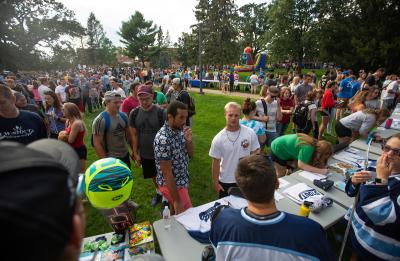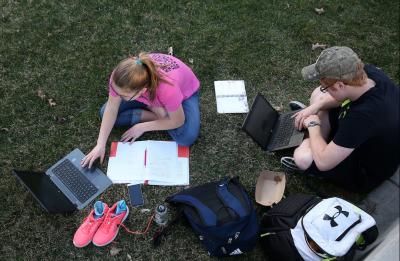Your student may be coming home for the upcoming breaks, and sometimes issues occur or surface at home that can affect your student’s attitude, participation in co-curricular activities, socialization, and ultimately their academic performance. These issues may look different between first- and second-year students. Often, first-year students are coming home for the first time, or for the longest period time, since leaving home in September. While, second-year students (and beyond) are easily forgotten... not literally, but it is easy to think they "have it all together" when there is so much more know!
If you have a first-year student coming home, please read on. For our second-year (and beyond) support teams, please follow the Supporting the second year (and beyond) link below.

First-year Support
One important way we have found to assist your student during their first year is through involvement throughout the year. Basically, it is your awareness of how their first year is progressing and which questions to ask to properly gauge the adjustment that makes the difference. A simple phone call to inquire about some tests, a care package in the mail, or a card letting them know you are thinking about them could provide the support that is needed.

UW-Stout and University Housing is committed to its students and has developed an Adjustment Survey to allow families the opportunity to actively participate in the total success of their student’s first-year experience. The survey is designed to give you some insights into their experiences thus far and to allow you the chance to glean important information from them so that you can participate in their success at Stout.
After asking your student the questions on the survey, if you feel that the answers you received are not as positive as you would like, please feel free to contact the professional staff member of the residence hall in which your student lives so that we can discuss the support that can be provided here at Stout. You can find the contact information for our professional staff on our Connect page. We are committed to the residents of Univesity Housing and ensuring that they are successful in their first year at UW-Stout.
First Semester Adjustment Survey
This survey is an aid for families and should help you get a feeling for your student’s progress at UW-Stout. A student who can respond positively to the following questions is showing good adjustment to college life and has a high probability of success at UW-Stout.
In our first-year buildings, the resident-to-RA ratio is about 30:1. Your student should be able to name their Resident Assistant, if they can't, please give us a call and we'd be happy to share with you how your student could be better connecting to campus!
| Hall | ARC |
|---|---|
| Antrim, Froggatt, & McCalmont | Tori |
| Curran & Kranzusch | Blessing |
| Hansen & Keith | Michael |
| Milnes & Chinnock | Rana |
| North | Danielle |
| South | Kaylin |
| Tustison & Oetting | Shana |
This will most likely be their roommate or other residents on the residence hall floor.
Rooming with someone can be difficult. Students can always go to their RA to talk through tough roommate situations. If a student feels that moving would be the best option they can see their Residence Life Coordinator about switching options or log into the Housing Gateway and pick a new room.
The 2020-2021 Housing Contract and Room Selection will take place in the coming months…information about the process will be sent to students. Please note the following Board of Regents Policy, “Those freshmen and sophomores (59 credits or less) who are not veterans, married, or living with parents or guardian (within a 40 driving miles of Menomonie), shall be required to live in a university-operated residence hall.” This policy will more than likely pertain to your student…please be sure that they are aware that they can not live off-campus next year and therefore should NOT be signing a lease with an off-campus housing provider.
Living on campus has many benefits. There are professional and student staff hired and trained to support, encourage, and develop students. We have on-site maintenance and custodial with fast response times to help keep the buildings clean and functioning smoothly. Housing rates are all-inclusive and there’s no need to worry about the heating bill. Classes, academic resources, and involvement opportunities are sometimes literally outside your door, other times just a quick walk down the sidewalk. It’s easy to network with others, connect to complete group projects, or find someone who wants to check out the movie/concert/speaker/etc. No need to cook; the Commons serves hot, fresh meals at a great price. Plus we are internship and study abroad friendly! No need to pay for a room here while you’re away studying and getting work experience.
Find more information about the Advisement Office and who your student's advisor is by visiting their website.
We encourage all of our students to Pick at least One (Pick One) student organization or activity to be involved in! There are over 160 student organizations at Stout, check out the Involvement Center website for information on them all. You can also find Student Organizations and campus events on the Connect website.
The RLC (Residence Life Coordinator) is a live-in, masters-level, professional staff member who works closely with in-hall engagement, involvement, and crisis management. You can find information about your student's RLC on the aside or at the bottom (on mobile) of this page.
Start small and help them set a goal for their first semester; somewhere between 2.75 and 3.5 is the norm.
If NO, do you know when your registration date and time is?
If YES, How many credits are you registered for?
- 12 credits is full-time student status
- 15 credits is what students generally enroll in.
Students have many options of professional staff with whom to connect. They may find a faculty, staff, or administrative person be their best point of contact. This may also include a favorite Professor, Supervisor, Residence Life Coordinator, or Counselor on campus. Check out the resource information on this page for contact details.
HLCs in each building meet weekly at the dates and times listed below, most often in a basement space. HLC is designed for students to design events for one another throughout the year and gain leadership experience. Everyone in the hall is welcome and considered a member of the HLC.
| Hall | Day | Time | Location |
|---|---|---|---|
| AFM | Tuesday | 7:00 pm | AF Basement Conference Room |
| CKTO | |||
| HKMC | Thursday | 6:30 pm | Milnes, Room 066 |
| North | Wednesday | 6:00 pm | North Basement Conference Room |
| South | Thursday | 6:00 pm | Main Basement Room |
A good follow up here is, Have you missed any days of school?
Most professors have an attendance requirement. Students can find this information out on the course instructions/syllabus on Canvas (our online learning tool). It is important that students are keeping track of this material as professors don’t usually make a habit of reminding students of class requirements.
If your student has missed more than three classes, please talk to them about academic resilience (the ability to bounce back and cope in a positive way—see image on the last page). Going to class and working hard are the best ways to be successful. A bad grade on an exam or paper does not mean a failed class, but if they get defeated by it and stop attending class, that starts the road to failing. We have many resources in place to help students be successful, such as advisors, tutoring labs, and their in-hall Academic Resource Coordinator. When you break it down, each class period costs approximately $40.
On average 2 hours should be spent outside the classroom for every credit hour (3 credit course = 6 hours outside work/study time).
During these tough economic times it can often be difficult for students to find a job and manage their finances. For more information about jobs, check out our student employment website.
Plan ahead! Financial Aid Counselors can be contacted at 715.232.1363 & Free Application for Federal Student Aid (FAFSA) can be filled out after October 1.
Clearly we want them to be happy at UW-Stout but maybe their academic major or personal interests are leading them in another direction. Try not to make any quick or drastic changes, encourage your student to talk to the Advisement Center to figure out their options.
A good follow-up here might also be, Do you feel like you can be successful there? Many students LOVE Stout but it may not be the right fit, it's good to open the door to a conversation around this before they are too far into the wrong program.




